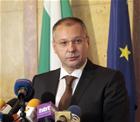Politics in Bulgaria Reached Quality Level 'Waste' - Unfit for Consumption
Adelina Marini, January 28, 2013
 The rotting process of Bulgarian politics and democracy has already reached European public. The first visible taking of the lid off Bulgarian chamber pot with a discharge of unpleasant smell happened in the end of last year when retorts were exchanged between the Party of European Socialists (PES), whose leader is former Bulgarian Prime Minister Sergey Stanishev, and the European People's Party (EPP), part of which is the currently ruling in Bulgaria party GERB (Citizens for European Development of Bulgaria) with a leader and Prime Minister Boyko Borissov. The occasion was a statement by Mr Stanishev before a forum of the Bulgarian Socialist Party (BSP) about the government, saying that "whoever loses people's confidence and does not want to leave in peace and in a democratic way, should leave in another way".
The rotting process of Bulgarian politics and democracy has already reached European public. The first visible taking of the lid off Bulgarian chamber pot with a discharge of unpleasant smell happened in the end of last year when retorts were exchanged between the Party of European Socialists (PES), whose leader is former Bulgarian Prime Minister Sergey Stanishev, and the European People's Party (EPP), part of which is the currently ruling in Bulgaria party GERB (Citizens for European Development of Bulgaria) with a leader and Prime Minister Boyko Borissov. The occasion was a statement by Mr Stanishev before a forum of the Bulgarian Socialist Party (BSP) about the government, saying that "whoever loses people's confidence and does not want to leave in peace and in a democratic way, should leave in another way".
It is that statement that worried the most the biggest European political family - EPP - and not, for instance, the other part of Sergey Stanishev's statement where he talks about an unfenced statehood, non-functioning institutions, that democraticity in the country is in danger. Instead, Wilfried Martens was astonished by the fact that the president of the second largest European party made such undemocratic statements at a press conference.
The second and more significant taking of the lid off was on January 19th this year when during a congress of the Movement for Rights and Freedoms (DPS) - a party  comprised mainly of ethnic Turks and a member of the Alliance of Liberals and Democrats for Europe - there was an assassination attempt against its leader Ahmed Dogan. The problem in this case is not as much in the fact that it is possible the life of a political leader to be threatened, but that a large part of Bulgaria's society did not believe that this was a genuine attempt and accepted the story as a farce, especially against the backdrop of the spectacular mob law by members of the party and the Bulgarian parliament with the failed attacker.
comprised mainly of ethnic Turks and a member of the Alliance of Liberals and Democrats for Europe - there was an assassination attempt against its leader Ahmed Dogan. The problem in this case is not as much in the fact that it is possible the life of a political leader to be threatened, but that a large part of Bulgaria's society did not believe that this was a genuine attempt and accepted the story as a farce, especially against the backdrop of the spectacular mob law by members of the party and the Bulgarian parliament with the failed attacker.
If by far Bulgaria was popular with Hristo Stoichkov, the assassination attempt against the pope, the murder of Georgi Markov, alcohol tourism, corruption and organised crime, the chalga and the mutri, it will soon become popular also with whether that country really is democratic after more than 20 years of transition and 6 years of EU membership. This, however, will be the natural conclusion to all of the above.
24 years of transition - 24 years of tail-chasing
The above incidents are just a bit louder explosions from the detonating mixture that has been bubbling for quite a long time and which the political class in Bulgaria with the total inaction of the civil society has been mixing for 24 years now. Hitherto, the EU believed that it has "sectoral" issues with Bulgaria - problems with justice and rule of law; unimplemented commitments under chapter "Environment"; macroeconomic imbalances. Now, when it became clear that independent media are scarce, the problem becomes even more evident and is even acknowledged openly in Bulgaria. That is the lack of democracy. Ahmed Dogan himself admits in his long speech [in Bulgarian] before the DPS congress that "democracy is not an objective reality set once and for all as a system of values. Democracy proved very vulnerable, with a permanent need of care for endorsement and development".
 Now, with hindsight, it is easy to see all the symptoms that either did not draw our intention all this time or we never managed to put them in the right group. One of the most striking things that Bulgarian politicians never learnt during the transition (which, in fact, was pronounced complete several years ago by some sociologists, but I think it has not started yet) is to take responsibility not in words but by resigning. In developed democracies a politician who failed his party in elections, who is accused of unclean relations with a shadowy businesses, in corruption, organised crime or even in cheating their marital partner, resigns.
Now, with hindsight, it is easy to see all the symptoms that either did not draw our intention all this time or we never managed to put them in the right group. One of the most striking things that Bulgarian politicians never learnt during the transition (which, in fact, was pronounced complete several years ago by some sociologists, but I think it has not started yet) is to take responsibility not in words but by resigning. In developed democracies a politician who failed his party in elections, who is accused of unclean relations with a shadowy businesses, in corruption, organised crime or even in cheating their marital partner, resigns.
Ahmed Dogan has been a leader of the DPS since 1990. Sergey Stanishev is at the helm of the BSP since 2001. Another former prime minister - Ivan Kostov - who is a leader of Democrats for Strong Bulgaria (DSB), has been leading the party since 2004, but before the DSB split from the Union of Democratic Forces (SDS), he was its leader too from 1994 until 2001. There are tens of smaller parties that have the same leadership ever since they were established. Political scientists define them as parties of the "leader's type". In other words, those are parties that would cease to exist without their leader.
And since democraticity is not inherent in the very political parties, it would be naïve to expect that they can enforce it on national level. People are totally deprived of faith. With every new round of parliamentary or other elections the number of people who find no one to vote for is growing. The same faces speak from the TV set, watch from the posters and ballot papers. For a growing number of voters elections are a farce, during which win those who bought the most votes. There is no term passing by without discussing the creation of permanent electoral rules that will stop being constantly changed to suit whoever for whatever needs, but that either does not happen at all or not as it was promised.
According to the global prosperity index for 2011 only 21% of Bulgarians stated they believe elections are fair. Not many more Bulgarians (22.60%) believe in the judiciary. In separation of powers believe only 12 per cent of the respondents. 78% said they consider the government and the business corrupt. And according to the autumn opinion poll of Eurostat, 91% of the Bulgarians said the economic situation in the country is bad. Worse are only the results of Cyprus, Romania, Spain and Greece (3 of which are with bailout programmes and for Cyprus negotiations on a bailout are ongoing).
It is great that in his speech, which he was unable to finish on January 19th because of the assault, Ahmed Dogan admits to the mistakes during the transition. Moreover, he calls that part of his speech a "confession". "If you will allow me I would like to confess in front of you as a man who has lived through the catharsis of Substitution of Democracy with Dictatorship" (capital letters are his). Of similar mistakes speaks PES leader Sergey Stanishev in his speech on December 8th in Sofia. "And we have to say: yes, we are part of the problems that happened in Bulgaria ...".
What do European political parties defend?
After the incident on January 19th against Mr Dogan, the big political groups in the European Parliament reacted differently. The EPP group condemned the attempts to politicise the incident and stood behind Premier Borissov, who left contradictory sentiments with his reaction to what happened. For the EPP, this was a criminal act that should not be used in the parliamentary elections in Bulgaria this year. Moreover, the biggest political group reminds the Liberals that "attacks against politicians are unfortunately not isolated cases, neither in Europe, nor worldwide. Therefore, such criminal cases should not be used for domestic political party disputes and brought to European level".
The leader of the third largest political group (ALDE) Guy Verhofstadt said for his part that what happened against the leader of a party of the liberal family is an occasion Bulgaria to be included in the forthcoming plenary debate. According to Mr Verhofstadt, an attack against a party leader during a congress raises many questions regarding the situation of democracy in Bulgaria.
The European political parties risk of getting "infected" by the low quality level of Bulgarian politics - now totally unfit for consumption - if they are to continue denying for the sake of not losing their power the serious issues some of their members have. In the summer of 2012, a conflict erupted between PES and EPP because of the political crisis in Romania, which was also a symptom of rotten democracy. The two parties exchanged accusations about Hungary too, where Prime Minister Victor Orban created a fear of a relapse of authoritarianism.
"Dear fans of Democracy!"
With these words Ahmed Dogan addresses the delegates of the 8th congress of the DPS, defining as problem number one for Bulgaria the "categoric restoration of Democracy" (capital letters are his). That appeal is very telling, especially conveyed by a man who is at the helm of his party for 23 years, who participated in non-transparently agreed coalition governments throughout the entire transition. It is also telling because on the eve of the congress information leaked that he was expected to step down. And he really did, remaining however an honourable chairman.
 Against this backdrop, the piling for years problems of lost democracy will break out stronger and stronger. For them responsibility bear the European political parties as well, which hold in their baskets spoilt eggs. Their smell will disperse ever more tangibly with the approach of the European elections in 2014 which the European Parliament and the chief of the European Commission rely very much on, hoping that they will be the first different elections, more oriented to the European citizens and to the building of a common European electoral space. European parties will participate in the elections with their entire baskets. It's true that the Bulgarian citizens will be able to choose from the Bulgarian eggs only, but it is also true that if the miasmas of the Bulgarian rotten politics continue to reach the noses of European citizens, that would most certainly have an impact on the European political parties as well.
Against this backdrop, the piling for years problems of lost democracy will break out stronger and stronger. For them responsibility bear the European political parties as well, which hold in their baskets spoilt eggs. Their smell will disperse ever more tangibly with the approach of the European elections in 2014 which the European Parliament and the chief of the European Commission rely very much on, hoping that they will be the first different elections, more oriented to the European citizens and to the building of a common European electoral space. European parties will participate in the elections with their entire baskets. It's true that the Bulgarian citizens will be able to choose from the Bulgarian eggs only, but it is also true that if the miasmas of the Bulgarian rotten politics continue to reach the noses of European citizens, that would most certainly have an impact on the European political parties as well.
It is hardly something they can easily swallow, especially against the backdrop of the conversation British Prime Minister David Cameron asked for and will most definitely insist on about the fact that there is something rotten in the EU and it is to a large extent related to democratic legitimacy. For a political leader of a nation with centuries-old democracy, it will be hard to swallow the need to appear, for instance, before the European Parliament where there are MEPs whose faith in democratic values (fundamental for the EU) is controversial.
As the eurozone crisis showed, the problems in a country can severely affect the  rest, no matter who is to blame, so on a political level the problems in a country could turn into a problem for all. For the EU, the process of enlargement is both a success and a failure. A success because many countries, crushed psychically and economically by communism, got a chance for a new life. And a failure because the EU underestimated the danger the path to democracy to prove narrow and winding. The elections in 2014 are a suitable moment for the Union to analyse itself. Not in the context David Cameron speaks of because he offers only two options - you are either with me or against me - but rather in the context of how should we continue from now on without obliterating everything that has been achieved so far. And the European political parties should lead in showing the problems and trying to clean the spoilt eggs. Otherwise, there is a risk the other eggs in the basket to begin decaying as well.
rest, no matter who is to blame, so on a political level the problems in a country could turn into a problem for all. For the EU, the process of enlargement is both a success and a failure. A success because many countries, crushed psychically and economically by communism, got a chance for a new life. And a failure because the EU underestimated the danger the path to democracy to prove narrow and winding. The elections in 2014 are a suitable moment for the Union to analyse itself. Not in the context David Cameron speaks of because he offers only two options - you are either with me or against me - but rather in the context of how should we continue from now on without obliterating everything that has been achieved so far. And the European political parties should lead in showing the problems and trying to clean the spoilt eggs. Otherwise, there is a risk the other eggs in the basket to begin decaying as well.
So, I would warmly recommend, at the next European political congresses, the leaders to launch an honest conversation about what do they have in their baskets and what to do with it. Otherwise, the turnout of the European elections will continue to shrink - from 63 per cent in 1979 to 43% in 2009.